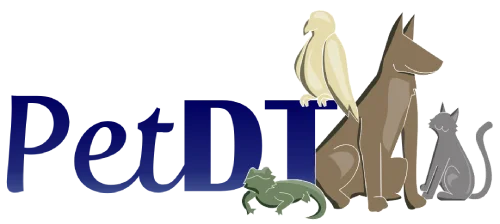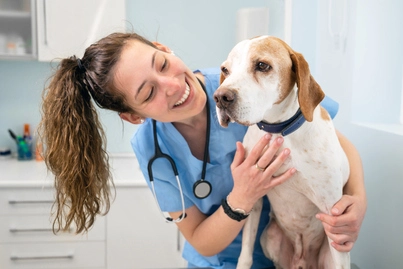Seeing your dog lap up urine will probably make you take pause and think, “what the heck?”
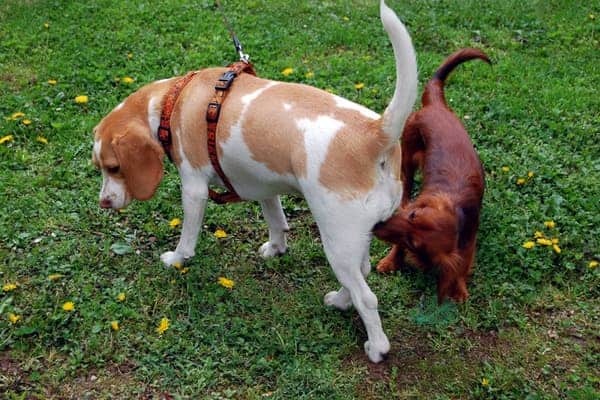
It’s not a socially acceptable behavior among people, but dogs don’t exactly abide by the same social norms we do.
They sniff each other’s butts (or lick their own butt), they lick themselves in public, and sometimes they’ll drink their pee or another dog’s pee.
Should you be concerned?
Contact a vet?
Alternatively, you can have a quick chat with a vet online now, which is both a cost and time savings.
Connect with a verified veterinarian in minutes. No waiting for appointments or office hours. No high fees. Your pet's health made convenient and worry-free.
A dog licking urine might be doing it for a number of reasons. As weird as it might seem, the explanations are actually not as odd as you might think.
So why do they do it?
Is there anything you can do to curb this behavior?
There could be several reasons behind this strange habit; in some cases, it might not do much good to ask them to stop.
We’ll look at the common reasons and if you should worry about this yucky action.
They’re Bored
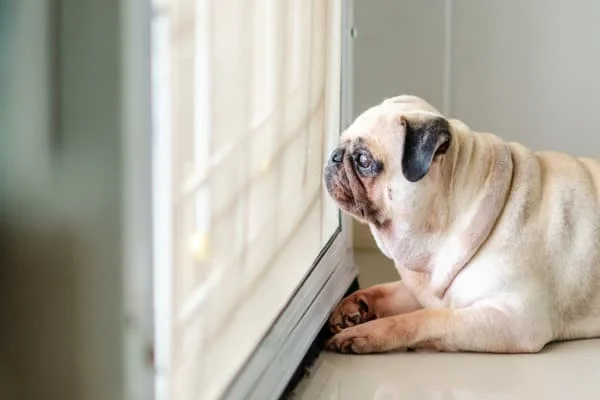
Dogs shouldn’t be cooped up for long stretches, day after day.
We understand that most pet parents work long hours, and leaving them alone during the day is often unavoidable.
Not devoting time to them once you’re home is a recipe for some really bad habits – including drinking their own urine.
Here’s why:
Dogs who are crated or kept inside for far too long will inevitably have an accident.
It’s always good to understand how long a dog can hold it’s urine.
If they’re kept in close quarters with the said accident, they might start to lick it up simply because they have nothing else to do.
Or they may in fact be trying to clean up their own mess if they can’t get around it easily. Usually, a dog won’t want to smell like urine if they’re forced to sit in it.
Sadly, this behavior is common among neglected dogs or those from puppy mills.
If you have rescued a dog from one of these backgrounds, urinating indoors and then drinking might just be part of their routine.
What Can You Do?
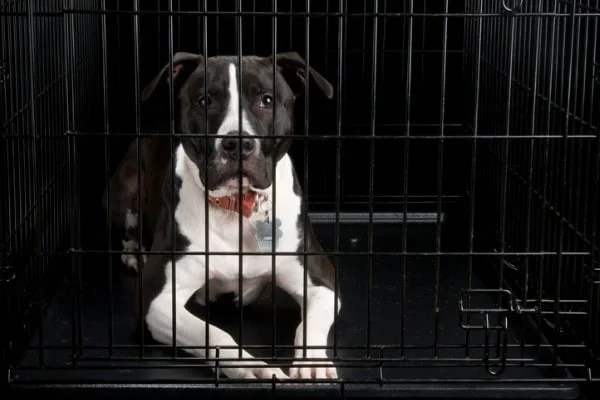
It is possible to teach your dog to stop this behavior.
Above all else, you shouldn’t leave them to their own devices more than you absolutely have to.
Taking them outside before you leave for work and as soon as you arrive home will not only give them a chance to empty their bladder and fight against issues like UTIs or mucus in their urine – it will break up the tedious hours they spend without you.
Keep them entertained:
Walks before and after you leave are best, especially if you have to work a full day.
If they’re crated, they’ll want plenty of time to exercise and play once you arrive home.
If you have to be away from home longer than a typical workday, it would be advisable to hire a pet sitter or dog walker to give your dog a break from being alone – and a chance to use the bathroom.
If there are struggles and your dog won’t pee outside easily when told, try and solve those issues as well.
What if you have a rescue that fell into this habit before they came to live with you?
Changing their routine might be scary and stressful for them at first, but it is essential that they don’t feel neglected or confined as they might have been previously.
Trust us on this one:
Lots of walks, exercise, and playing with you or other dogs will help gear their minds to associate you with good things.
It will also give them less chance to display unhealthy behaviors, such as chewing, pacing, or having accidents and then eating them.
Housetraining might be in order if the dog is used to eliminating whenever they need to.
Even adult dogs respond well to positive reinforcement.
Getting them on a good bathroom schedule and rewarding them each time they potty outside are the best things you can do.
As frustrating as it might be, don’t scold them for accidents. Instead, take them directly outside.
Scolding them for urinating or licking their urine can start a vicious cycle, which is even harder to break.
We’ll talk about that next.
They’ve Been Conditioned to Do It
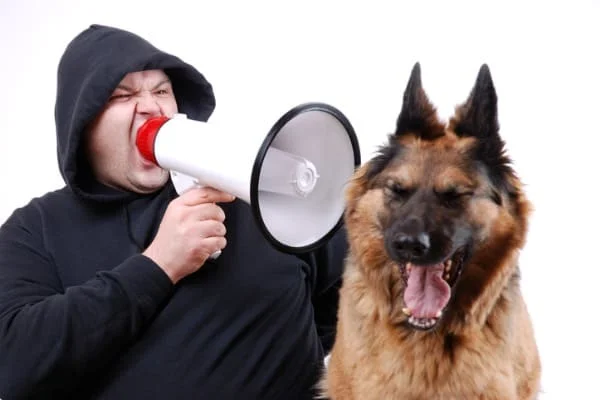
Some “bad” behaviors in dogs are the result of improper training, fear, and overall anxiety.
A once-accepted housetraining technique included rubbing a dog’s nose in their waste if they had an accident.
An even worse practice was putting their food dish over the spot they had the accident at feeding time.
Both of these punishments are not only useless in teaching the dog good house manners; they can cause dogs to pick up some very nasty habits.
Why?
Dogs don’t understand punishment the way mature humans can.
Most dogs have the mental capacity of a child around 2-2.5 years of age.
While both dogs and toddlers can understand things like the word no, redirection, and positive reinforcement, punishment is a concept they can’t fully comprehend.
That means that if your dog had an accident an hour ago, and you yell at them once you discover it, they will have no idea why you’re upset.
For a dog to understand that peeing inside is bad, you would have to catch them in the act.
This isn’t always easy.
Sometimes it is, say if your dog pees on your bed right in front of you!
Even then, yelling or swatting them with a rolled-up newspaper will do more harm than good.
In this scenario, the better action to take is to take them outside quickly.
A firm “no,” is enough to relay to them that they’re not allowed to do what they’re doing.
So what does this have to do with them drinking their own urine?
Dogs who have had their noses rubbed in their own puddles, or are yelled at or punished for accidents, can eat their own waste out of fear.
Some experts think it’s their way of “destroying the evidence” to avoid being punished.
Other experts suggest that rubbing a dog’s nose in their own puddle makes them think you must want them to drink it.
It’s not something they would do on their own, but fear and anxiety can turn it into a learned behavior.
Well-informed pet parents never do this to their pets.
If you have a rescue, this type of treatment is something they might have been subjected to in the past.
How Can You Help?
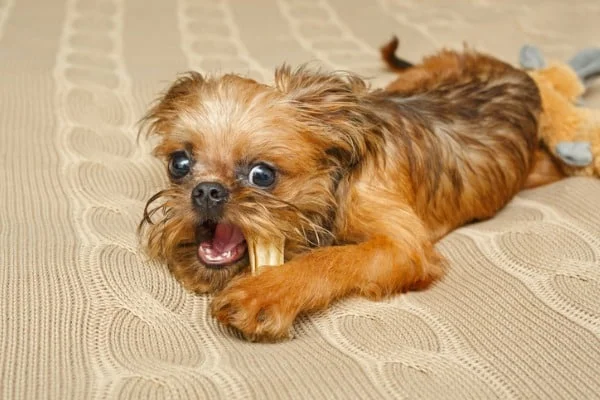
Just like any dog who needs toilet training, patience, and a gentle hand will go much farther than corporal punishment.
Reward and praise!
Treat your dog like a rockstar each time they pee in acceptable environments.
They respond very well to praise and treats.
For dogs and puppies being house trained, it’s totally alright to be their personal groupie – cheer them on when they eliminate outside.
They’re Thirsty
Yes, dogs can go full Bear Grylls if they get too thirsty.
The good news is that most healthy dogs won’t do this if they have access to fresh water.
A normal dog would have to become quite dehydrated before they resort to drinking their own urine.
Be mindful of how much water they drink, along with monitoring the color of their pee – dark dog urine is one sure sign of dehydration.
Does age matter?
Puppies and elderly dogs are more likely to do it.
Since puppies still have a lot to learn about the world and don’t always think critically, they might drink their own pee when the water bowl is in the next room.
An older dog drinking their own urine might be confused. Elderly dogs can suffer from dementia and sundowner’s syndrome.
This can cause them to urinate inside, and it can also cause them to try to drink their own urine even if they have a perfectly good water source.
It can also be a behavior that neglected dogs have picked up because they were once deprived of water for long periods.
What’s the Solution?
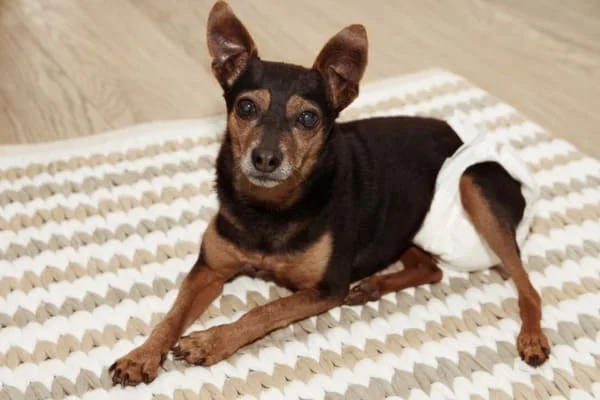
Puppies have accidents – it happens to the best of them while they’re still learning house rules.
Cleaning up their puddles as soon as possible helps prevent them from drinking from them.
Make sure they can reach water bowls and actually know where the water dish is in the house.
Smaller water bowls might be necessary for tiny puppies, at least until they get big enough to drink from a larger dish.
Old dogs often need as much supervision as puppies.
Caring for them in their twilight years can be challenging, but there are a few tools that can help make it an easier task.
Dogs with incontinence issues can wear diapers or belly bands. Just be mindful of dog urine scald that dogs are prone to.
Keeping them from urinating on the floor is the first step in avoiding them drinking it.
Sometimes it’s hard, though, if your dog leaks urine when lying down.
You might need to remind an elderly dog where their water dish is.
It can also be helpful to keep it near where they like to hang out the most.
If there are issues with your dog not eating or drinking and laying around, them drinking their own urine is the least of your problems.
In other words, consider any other possible signs of abnormality!
Let’s Stick to Water
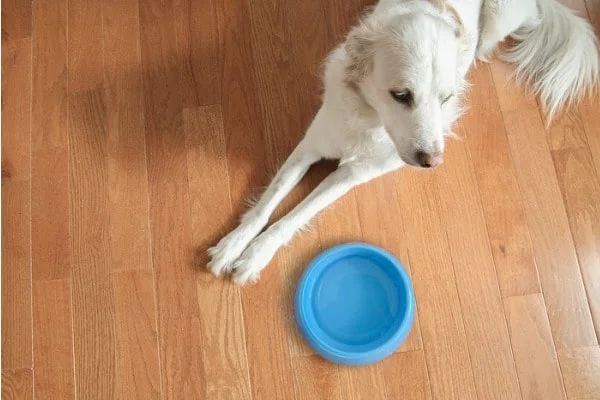
Although you don’t want to punish your dog for drinking their own urine, you can encourage them not to do it.
Breaking rescue dogs of this habit can be especially difficult, but it’s not impossible.
A dog licking urine could be anxious, bored, confused, or just thirsty. Identifying the underlying cause will make correcting the behavior much easier.
Keep in mind:
It helps to remember that if your dog does this from time to time, it’s not exactly harmful to them (but could be harmful to humans!)
What you want to avoid is them replacing healthy hydration with drinking their own pee.
You also won’t want any kisses from them if they’ve just lapped up urine – it is understandably not a thing you want them constantly doing.
Redirect, use positive reinforcement, and ensure there’s always clean water nearby – in time, dogs with this habit will learn it’s better just to drink water.
